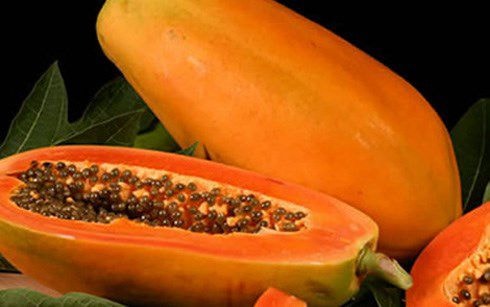Side effects of ripe papaya
Eating too much ripe papaya will make the following diseases worse: yellow skin, stomach, allergies...
Ripe papaya is not only a delicious and nutritious food but can also be used as a medicine to treat many diseases. However, for some people, eating too much ripe papaya will make their illness worse.
Papaya can be considered a "panacea" because many parts of the papaya tree are not only used as food but also as medicine to treat many diseases.
 |
In 100g of ripe papaya there are 74-80mg of vitamin C and 500-1,250 IU of carotene. Papaya also has vitamins B1, B2, enzymes and minerals such as potassium, calcium, magnesium, iron and zinc.
Eating papaya regularly has the effect of enriching the blood, helping to restore the liver in people with malaria, is an antioxidant, and increases the body's resistance...
People with jaundice
Not only ripe papaya, pumpkin, carrots, mango… are all foods that contain a lot of Beta carotene. Many people eat a lot of these foods, leading to yellowing of the palms, soles, backs of hands, and backs of feet due to the accumulation of Beta carotene.
To improve this symptom, you should stop eating for a while. If the condition does not improve, you should see a specialist to find out the cause.
People with stomach problems
Eating ripe papaya regularly will stimulate the digestive system, reduce symptoms of indigestion and constipation. However, eating too much papaya will upset your digestive system, possibly causing stomach disorders with symptoms such as abdominal pain, nausea, bloating, abdominal distension...
The main culprit behind these symptoms is the abundance of fiber and papaya latex in the stomach which causes the stomach to contract a lot. It even irritates the stomach causing vomiting.
People with allergies
If you have a respiratory disorder like asthma, or any allergies, be careful when eating papaya. Sometimes pollen can stick to the papaya skin, so make sure you wear gloves when peeling the papaya. Throw the peel and gloves in the trash immediately after peeling. You should also cover your mouth and nose with a scarf to avoid allergies.
Papaya allergy often has the following symptoms: swelling of the mouth, itching around the face and throat, rash on the tongue, dizziness, headache, abdominal pain, difficulty breathing and difficulty swallowing.
People with poor digestion
Papaya is considered an effective natural remedy for constipation, but if overused, the result will be completely opposite. Because when the fiber content is high, the amount of water also increases, the stool will become hard and cause constipation.
People with diarrhea should not eat too much because of the high fiber content. If you eat too much during this time, your body will easily become severely dehydrated.
People with blood thinning disease
People with blood thinning conditions should avoid eating papaya as papaya leaves have blood thinning properties. So if you are taking any blood thinning or anticoagulant medication such as aspirin, or have undergone surgery in the past few weeks, stay away from this fruit due to its anticoagulant properties.
Note: Papaya seeds are very good for medicinal purposes, but when eating them, you should be careful to remove all the seeds, because papaya seeds contain a toxic substance called carpine. A large amount of carpine will cause heart rhythm disorders and weaken the nervous system./.
According to VOV.VN






